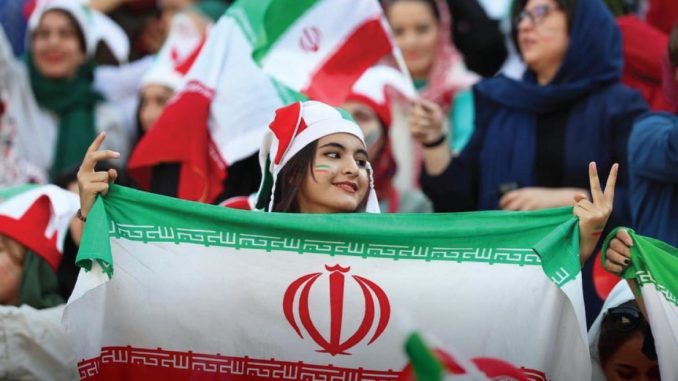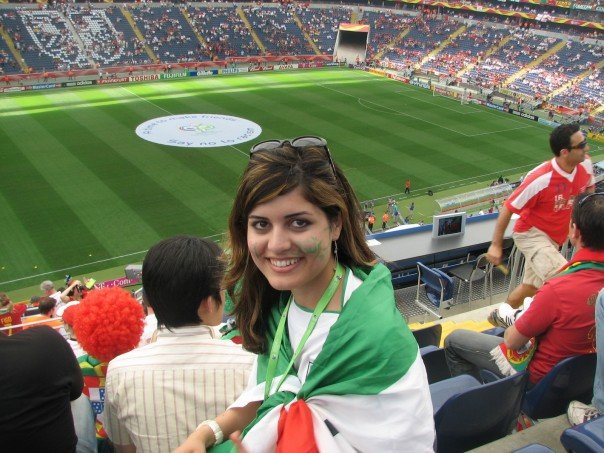
When it was first announced that Iranian women could buy tickets for a football match, they had to pinch themselves to believe it.
For the Iran versus Cambodia World Cup qualifier on 10 October, for the first time in 40 years, women could legally buy tickets. The wait was finally over.
Iranian women rushed to their computers and bought their dream ticket to their first football match in 40 years. For some of them, it would be the first ever game in their lifetime. No wonder the limited tickets available for women were sold out within two hours.
While this 40 year ban is not written into law or regulation, it has been strictly enforced by football and security officials throughout sporting arenas in Iran. Although women were free to watch games at stadiums in the past, ever since the 1978 Revolution in Iran, religious figures influenced the Ministry of Sport to ban the entry of women into sporting arenas.
Their reasoning was: “(The) danger of women mixing with men, and women hearing men’s swear words at stadiums.”
Whereas, others argue, women are mixed with men on the streets every day, so why can’t the same rule apply in sporting arenas? Or that, just like European leagues where going to stadiums is more of a family tradition, men tend to swear less when women are present.
For years, Iranian women and girls who wanted to cheer for their national team, or their favourite club, would defy the ban by disguising themselves as men. They would pose for pictures with their artificial beard and post it on their social media profiles.
Many of these girls, instead of going to the stadium and enjoying a game of football, with the pulsating adrenaline of the crowd celebrating a goal, would be arrested at the gates.

I, for one, never got the chance to see this historic day. My dream as a football fan was, and still is, to cheer for Iran, and ironically I was not allowed to do that in my homeland.
As the most passionate football fan among my close circle of friends and family, I felt sad and discriminated against that I couldn’t support the national team of my country at the games that matter, such as World Cup qualifiers.
Yet I would see empty seats at Azadi Stadium for World Cup qualifiers such as Iran-China, or Iran-Qatar. In some games, the Iran Football Federation would make the games free entry for men just to fill up the stadium.
Hearing and watching that would really sadden me, knowing that Federation would rather keep the stadium half empty, or give away free tickets to men, but not allow women into the stadiums. For all those years, my only option was watching national team and league games on TV.
That was until my opportunity came, when Germany hosted the 2006 FIFA World Cup and Iran qualified.
I saw so many Iranian men and women coming from all over the world to attend the games. This unity was beautiful to watch. I went to Iran’s training camp and watched the team prepare ahead of the World Cup.
It was there that I was approached by a German media outlet wanting to interview me, wanting to know why I had travelled to Germany, and about the stadium ban for women in Iran. Travelling solo just to be able to see and cheer, for the first time, my national team, came as a surprise for the German reporter.
That trip and that stadium experience was the best experience I have ever had.
There have been many factors though that have led to overturning of the ban. The ‘White Scarves’ movement, and ‘Open Stadium’ have long campaigned for freedom of stadium entry for women.
Although some would credit FIFA president Gianni Infantino for his pressure, the real turning point was ‘Blue Girl’ setting herself on fire.
In September, a female football fan, Sahar Khodayari, dubbed ‘Blue Girl’ because of her support of Esteghlal, died after setting herself on fire outside a courthouse when she was given a six month jail sentence for attending a match at Azadi Stadium disguised as a man.
‘Blue Girl’s’ innocent face after her death sparked outrage amongst female athletes and football stars around the world, while local fans in Iran chanted her name during games.
Khodayari’s death reminded FIFA officials of the urgent action that needed to be taken to ensure all Iranian women are allowed into all stadiums, at all times, even for league games.
Just a few days ago, Infantino announced that he will travel to Iran in January to make sure women are allowed into stadiums for domestic league games.
However, any talk of further progress needs to be taken with a grain of salt, as recently the highest religious figures in the country voiced their opposition to women attending stadiums and warned Iranian football officials against continuing to allow women into stadiums.
While it seemed like October was an historic moment for Iranian women, it wasn’t the end of journey, but just the start of a new challenge.
Photo: twitter/theafcdotcom
Listen to our interview with campaigner Maryam Shojaei, brother of Iranian national team star Masoud, as she talks about the lifting of the stadium ban on Episode 43 of The Asian Game podcast.




